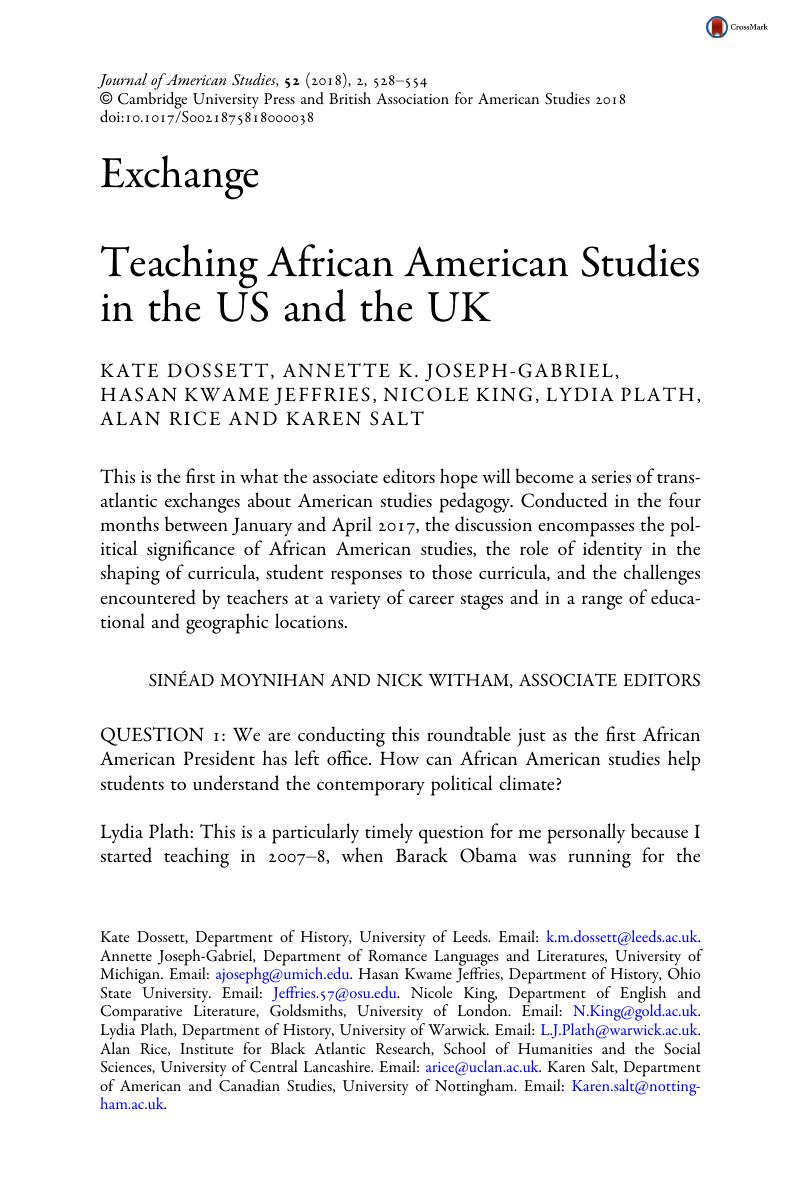No CrossRef data available.
Article contents
Teaching African American Studies in the US and the UK
Published online by Cambridge University Press: 04 May 2018
Abstract

- Type
- Exchange
- Information
- Copyright
- Copyright © Cambridge University Press and British Association for American Studies 2018
References
1 See Crenshaw, Kimberlé, “Mapping the Margins: Intersectionality, Identity Politics and Violence against Women of Color,” Stanford Law Review, 43, 6 (July 1991), 1241–99CrossRefGoogle Scholar.
2 For one example see the controversial “Trump Syllabus” and the response to it from the African American Intellectual History Society (Trump Syllabus 2.0). “Trump 101,” Chronicle of Higher Education, 19 June 2016, at www.chronicle.com/article/Trump-Syllabus/236824, accessed 7 Aug. 2017; N. D. B. Connolly and Keisha Blain, “An Introduction to Trump Syllabus 2.0,” Black Perspectives, 28 June 2016, at www.aaihs.org/an-introduction-to-trump-syllabus-2-0, accessed 7 May 2017.
3 Mitchell, Koritha, Living with Lynching: African American Lynching Plays, Performance, and Citizenship, 1890–1930 (Urbana-Champaign: University of Illinois Press, 2011)CrossRefGoogle Scholar.
4 “Prime Minister Orders Government Audit to Tackle Racial Disparities in Public Service Outcomes,” 27 Aug. 2016, at www.gov.uk/government/news/prime-minister-orders-government-audit-to-tackle-racial-disparities-in-public-service-outcomes, accessed 6 May 2017.
5 Alexander, Claire and Arday, Jason, Aiming Higher: Race, Inequality and Diversity in the Academy (London: Runnymede Trust, 2015), 32Google Scholar.
6 William Ackah, “There Are Fewer than 100 Black Professors in Britain – Why?”, The Conversation, 10 March 2014, at http://theconversation.com/there-are-fewer-than-100-black-professors-in-britain-why-24088, accessed 6 May 2017.
7 Hall, Stuart, “Cultural Identity and Diaspora,” in Rutherford, Jonathan, ed., Identity: Community, Culture, Difference (London: Lawrence and Wishart, 1990), 222–37Google Scholar.
8 James, C. L. R, “Black Studies and the Contemporary Student” (1969), in James, At the Rendezvous of Victory (London: Allison & Busby, 1984), 186–201Google Scholar.
9 Andrews, William L., ed., The Oxford Frederick Douglass Reader (New York: Oxford University Press, 1996)Google Scholar.
10 “PRO TS 11/45/167, Rex v Wedderburn, Examination of William Plush” (1819), in The Horrors of Slavery and Other Writings by Robert Wedderburn, ed. Iain McCalman (Princeton, NJ: Markus Wiener Publishers, 1991), 120–22, 122.
11 In her biography of Sojourner Truth, Nell Irvin Painter argues that though the ideas presented in Truth's speech were indeed Truth's, the framing and rhetoric were very much the work of the abolitionist Frances Dana Gage. See Painter, Nell Irvin, Sojourner Truth: A Life, a Symbol (New York: W. W. Norton and Company, 1996)Google Scholar.
12 See, for example, Davies, Carole Boyce, Left of Karl Marx: The Political Life of Black Communist Claudia Jones (Durham, NC: Duke University Press, 2007)CrossRefGoogle Scholar; McDuffie, Erik S., Sojourning for Freedom: Black Women, American Communism, and the Making of Black Left Feminism (Durham, NC: Duke University Press, 2011)Google Scholar.
13 For examples see Crenshaw, “Mapping the Margins”; Collins, Patricia Hill, “It's All in the Family: Intersections of Gender, Race, and Nation,” Hypatia, 13, 3 (Summer 1998), 62–82CrossRefGoogle Scholar.
14 Robin D. G. Kelley, “Black Study, Black Struggle,” Boston Review, 7 March 2016, at https://bostonreview.net/forum/robin-d-g-kelley-black-study-black-struggle, accessed 7 May 2017.
15 Alice Ross, “Universities Do Not Challenge Racism, Says UK's First Black Studies Professor,” The Guardian, 23 Oct. 2016, at www.theguardian.com/education/2016/oct/23/universities-do-not-challenge-racism-says-uks-first-black-studies-professor, accessed 7 May 2017.


